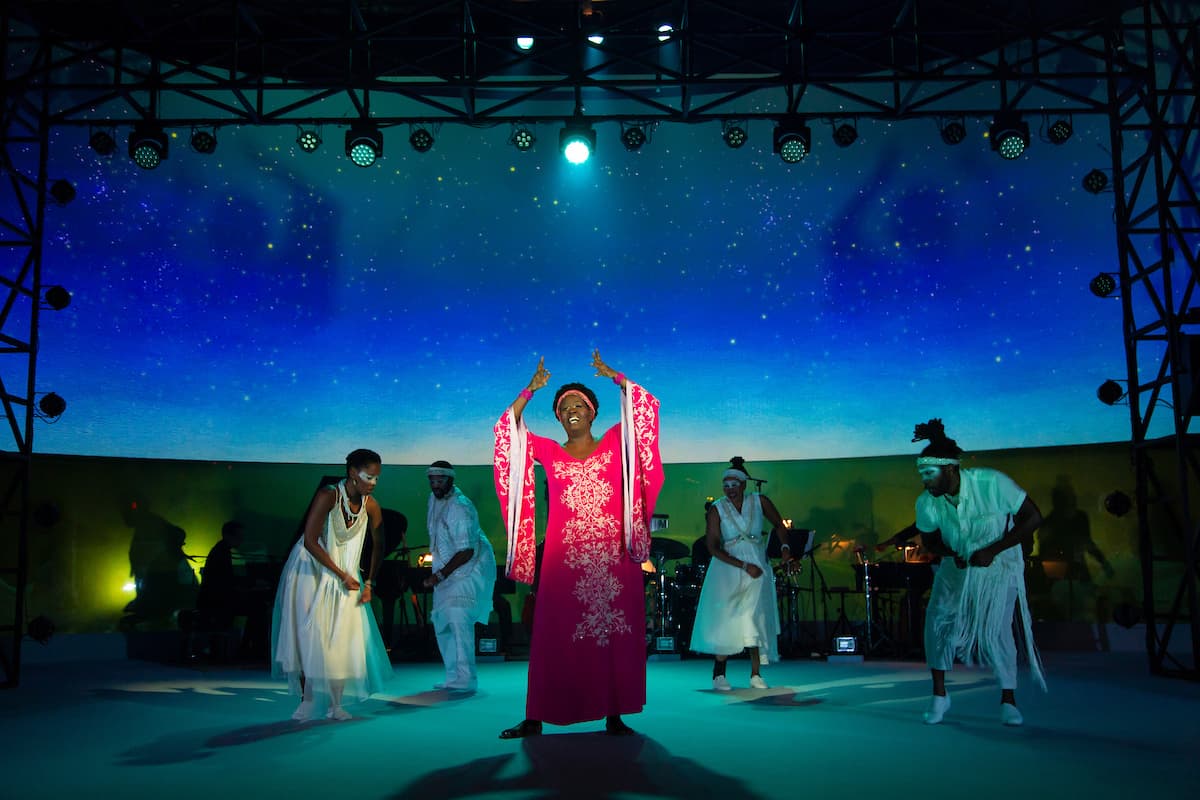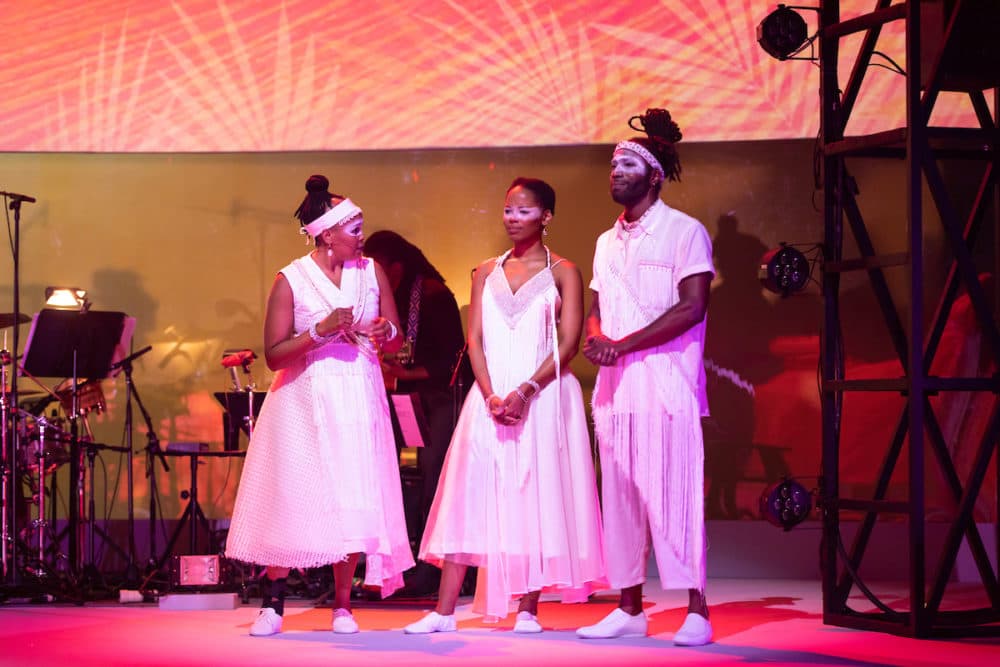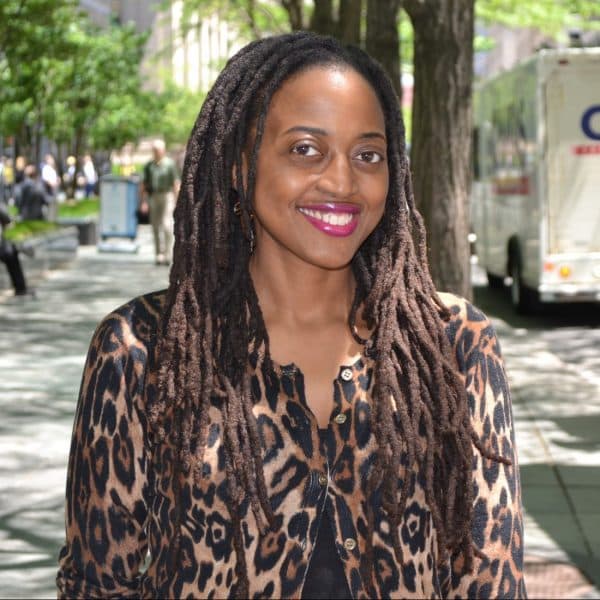Advertisement
'Dreaming Zenzile' honors the music and legacy of Miriam Makeba

Honesty — that's what jazz singer Somi Kakoma aspires to with her latest project. The Grammy-nominated artist has been working to bring her first play, "Dreaming Zenzile," to fruition for years. The narrative centers on the late vocalist and anti-apartheid activist Zenzile Miriam Makeba and uses Makeba's final concert in Castel Volturno, Italy, as an entry point. The show, directed by Lileana Blain-Cruz, stars Kakoma as Makeba and opens at Arts Emerson on Feb. 23.
The production features a live jazz band playing original music and reinterpretations of Makeba's repertoire. In the story, "the ancestors are calling Makeba and transporting her through the music and fractured memories of her past on a spiritual journey of reconciliation."
Makeba was born in Johannesburg, South Africa, in 1932 and started singing at a young age. She rose to fame in South Africa in the 1950s and appeared in a documentary film, "Come Back Africa," in 1959. Soon after, she moved to the United States. Makeba continued to release albums until her death from a heart attack after her concert in Italy in 2008. But a lot happened in between.
Kakoma, born to Ugandan and Rwandan parents, grew up listening to Makeba's music and thought she had a good understanding of Makeba's life, legacy and career. But once she started to dig a little deeper, she realized there was much she didn't know about the prolific artist.
"There's been a sort of sustained erasure of her voice that happened in the 1960s when she married Stokely Carmichael [a Black Panther]," Kakoma explains. "I'm speaking specifically about her legacy in the United States. As a result of that marriage, she was blacklisted and her career came to a screeching halt at the height of her celebrity."
Makeba was also exiled from her home country of South Africa for her stance against apartheid for roughly 30 years. Kakoma points out that, on top of her treatment from the South African government, she was "exiled in a way, culturally from the United States."
This is a type of cultural violence, silencing an artist's voice and not allowing her to reach the people, Kakoma shares. "It wasn't until around the 1980s that she was reintroduced to the American public via Paul Simon's Graceland tour," she says.
Iterations of "Dreaming Zenzile" have been bubbling in Kakoma's soul for quite some time. She started researching in January of 2015, she says. The first public reading of some version of a story was in December 2016 at The Public Theater. At the time, the show was about 70 minutes.

The birth of this work is "a meditation over time," Kakoma offers. In between recording and touring, Kakoma worked on the play through different workshops and grants and then she spent five months in South Africa at the end of 2018 for research and language study.
By February 2020, she started rehearsals for the first production, but the premiere — slated for March 2020 — was postponed due to the pandemic.
Kakoma and the cast finally performed the first show at the Repertory Theatre of St. Louis in September as part of a rolling premiere, Kakoma says. Even as the show moves from city to city, she continues to shape the narrative as needed. "Act one is very different from what it was in St. Louis. The story hopefully is the same, but the journey is clearer. "
In addition to “Dreaming Zenzile,” Kakoma will release an album, “Zenzile: The Reimagination of Miriam Makeba,” next month that’s in conversation with the play.
Makeba's voyage was an interesting one. She was an international star who used her platform to protest apartheid; she was exiled and reportedly divorced four times. But she was also a mother, and as a performer, she worked with many famous contemporaries of her time, including Harry Belafonte, Nina Simone and The Manhattan Brothers.
"There are burdens and freedoms that come with every gift, particularly the gift of song," Kakoma says. The story shines a light on "all that an artist might carry, and the grace and generosity that is required to still show up on stage."
"Dreaming Zenzile is a wonderful combination of the epic journey of somebody's life, this real human being — Miriam Makeba — and wanting to honor her, the truth of her existence and the magnitude of her story," says Blain-Cruz.
When choosing a project to direct, Blain-Cruz looks for "what feels alive and most urgent," she says. (Blain-Cruz is an Obie Award-winning director and Lincoln Center Emerging Artist and recently directed esperanza spalding and Wayne's Shorter's "…(Iphigenia).”)
"I think one of the feelings I chase when making and seeing work is when you walk out of the theater and your whole body is vibrating,” she adds. “…You feel alive and you're excited, and you want to debate it and think about it and you're still chewing on it and digesting it and you feel you're more alive and invigorated after having experienced it."
For Kakoma, this project has caused her to shift and stretch in many ways, she says. When embodying Makeba, she thinks a lot about taking on Makeba's voice while still honoring her own.
It all comes back to honesty.
"I want to honor all that she was carrying and all that she achieved," Kakoma says.
"I'm in pursuit of honesty, and I'm in pursuit of surrender. I'm surrendering to the moment. That's my prayer."
Presented by Arts Emerson, “Dreaming Zenzile” runs Feb. 23-27 at the Emerson Paramount Center.


